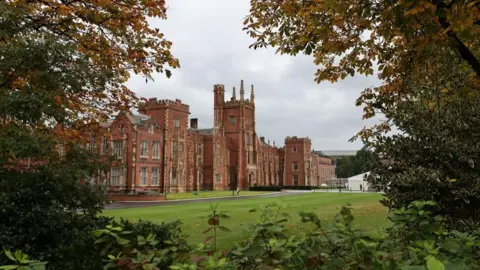 Anna Jonak
Anna JonakTop degree grades are awarded to about three in every 10 students at Northern Ireland’s universities, new figures show.
The proportion of students achieving first-class degrees in Northern Ireland in 2022-23 was 29% – a slight fall from the previous year – figures from the Higher Education Statistics Agency (HESA) show
Across the UK as a whole, the number of top degrees awarded is about 50% higher than a decade ago.
Statistics also show that the number of international students in Northern Ireland has increased in recent years.
 PA Media
PA MediaUniversities award undergraduate degrees in four broad results classifications – first class honours, upper second class (2:1), lower second class (2:2), and third class or pass.
Universities are their own degree-awarding bodies, so decide grades based on things such as exams, coursework, theses or practical work from students.
‘I worked really hard, so I know I deserve it’
Anna Jonak from Portadown in County Armagh recently graduated from Queen’s University Belfast with a first-class degree in psychology.
She started her degree in 2020 at the height of the coronavirus pandemic and said the transition from daily in-person classes to fully remote learning was really challenging.
“Time management was really hard, from being in a classroom where the teacher goes through everything with you, to sitting at home and having everything online – I didn’t think I would do well,” she told BBC News NI.
Anna sat all her exams remotely apart from her final year.
“We initially had 24 hours to answer a question and it was all open-book, then for final year we were brought back in-person and under time constraints so that was really hard,” she said.
“When I found out I got a first I was so shocked, I was walking around for ages thinking ‘did that really happen’.
“The whole year I was really doubting myself as my marks were always straddling a 2:1 or first.”
“I don’t think firsts are just handed out.
“Yes, our initial exams were remote and open-book but that was taken into consideration during the marking.”
International students in NI
The HESA figures also suggest that there were around 16,000 students from across the rest of the world studying in Northern Ireland in 2023, around a quarter of all students here.
Previous research has suggested that international students are worth nearly £1bn to Northern Ireland’s economy.
There was a significant rise in top degree grades in the two academic years most affected by the coronavirus pandemic – 2020 and 2021.
In 2021, for instance, more than a third of degrees in Northern Ireland (34%) were first-class.
In 2023 by contrast, according to HESA, 29% of students in Northern Ireland were awarded first-class degrees – 2,455 students in all.
Upper second class degrees were awarded to half of students, while about one in five got lower second or third-class degrees.
The most popular degree courses were in subjects related to medicine, business and management and social sciences.
Higher education results trends in Northern Ireland are similar to those across the rest of the UK, which also saw a slight fall in the proportion of first-class degrees awarded in 2023 compared to 2022.
India sent more students to Northern Ireland – and the UK as a whole – in 2023 than any other overseas country.
While most Northern Ireland students enter higher education in Northern Ireland, about a quarter of Northern Ireland students study elsewhere in the UK.





